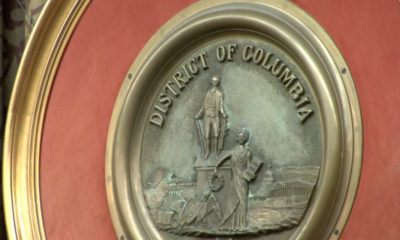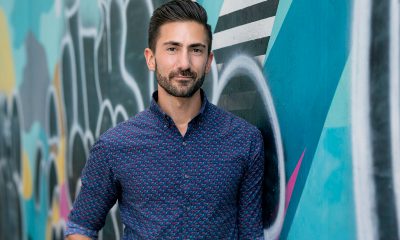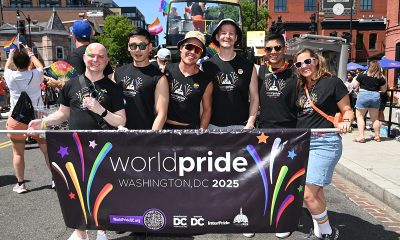Local
Catania, Graham breeze to victory; 7 gays win in Md.
Fenty write-in votes high in gay precincts
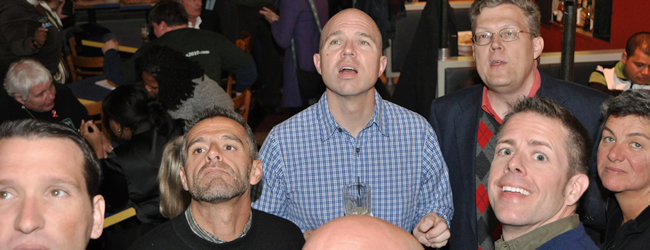
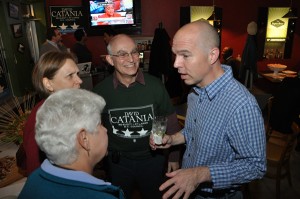
David Catania's re-election to D.C. Council was one of the few bright spots on an Election Day widely regarded as a disaster for gay rights. (Blade photo by Michael Key)
Pro-gay D.C. Council Chair Vincent Gray won his race for mayor with 73.9 percent of the vote and gay Council members David Catania (I-At-Large) and Jim Graham (D-Ward 1) easily won re-election Tuesday.
But an unauthorized write-in campaign for Mayor Adrian Fenty, who lost the Democratic mayoral nomination to Gray in the Sept. 14 primary, yielded high write-in vote counts in nearly all voter precincts with a high concentration of gay residents.
In Maryland, the number of out gay or lesbian members of the state legislature increased from four to seven in Tuesday’s election. Among the winners is Mary Washington, who captured a House of Delegates seat from Baltimore to become the first black lesbian to win a seat in the Maryland Legislature and the second to hold that distinction in the nation.
The “write-in” category in the D.C. mayor’s race won in at least two precincts with high concentrations of gays on Capitol Hill, highlighting the same racial divisions among voters that surfaced in the primary, where Gray won in majority black sections of the city and Fenty won in majority white areas.
Most of the gay precincts are in majority white sections, such as Dupont Circle, Adams Morgan, Logan Circle and Capitol Hill. Activists familiar with the LGBT community have said black gays, like their straight counterparts, supported Gray in overwhelming numbers. But because they are dispersed throughout the city and not concentrated in gay enclaves, like those in the mostly white areas, there are no known “black gay” precincts.
“I don’t think those are anti-Gray votes as much as they are pro-Fenty votes,” Catania said on Wednesday. “I think the vast majority of them, after the inauguration, those very same people will be very receptive to Vince and his message, and we’re all going to come back together.”
In his victory speech late Tuesday night at Love nightclub in Northeast D.C., which once hosted the city’s black LGBT Pride festival, Gray reiterated his campaign theme of “one city,” saying his administration will work hard to build unity among D.C.’s diverse population groups.
Most of the city’s LGBT activist leaders joined the Gertrude Stein Democratic Club, the city’s largest LGBT political group, in backing Gray in the mayoral race.
Gray captured 73.9 percent of the citywide vote, with the “write-in” vote coming in second with 22.8 percent. However, in majority white Wards 1, 2, 3, and 6, the margin between the Gray and write-in vote was closer, with the write-in vote count rising to between 30 and 43 percent. In Precincts 89 and 90 on Capitol Hill, which are home to a sizable gay population, the write-in vote came to 50.3 percent and 50.5 percent respectively, with Gray receiving 46.3 percent and 45.5 percent.
In the majority black Wards 4, 5, 7, and 8, the write-in vote fell to single digits.
D.C. Board of Elections and Ethics executive director Pokey Suleman said the city’s election law bars the board from identifying the names of people receiving write-in votes unless they capture enough votes to win the race. Most election observers assume the vast majority of write-in votes in Tuesday’s mayoral election went to Fenty.
“I would presume that the majority is for Fenty but I would not presume all of them are,” Suleman said.
In the at-large Council race, Catania came in second behind Council member Phil Mendelson (D-At-Large) in a four-candidate contest where the highest two vote-getters win the seats. Mendelson, who has a strong record of support on gay issues, and Catania endorsed each other.
Mendelson received 58.3 percent, with Catania receiving 30.9 percent of the vote. Both came out far ahead of challenger David Schwartzman, the Statehood-Green Party candidate who supports LGBT equality; and anti-gay independent candidate Richard Urban, who called for repeal of the city’s same-sex marriage law. Schwartzman received 6.8 percent and Urban received 5.1 percent. Non-Democratic candidates who win at-large seats traditionally have received less votes than the Democratic candidate in a city where the overwhelming majority of voters register as Democrats.
In the Ward 1 Council race, Graham received 81.3 percent of the vote compared to his gay Republican challenger, Marc Morgan, who received 7.6 percent of the vote. Statehood-Green Party candidate Nancy Shia received 9.5 percent.
Ward 5 Council candidate Tim Day, who became the fourth out gay candidate running for a D.C. Council seat this year, lost to incumbent Council member Harry Thomas, a Democrat, by a lopsided margin of 84.0 percent to 5.9 percent.
Day received the endorsement of the Washington Post. He drew additional news media coverage by disclosing IRS and D.C. corporation office records showing that a charitable constituent group that Thomas had been operating for many years did not have a tax exemption from the IRS and lost its corporate status from the city. The Post criticized Thomas over his handling of the charitable group. But the flap over the group did not help Day, an accountant, garner much support from voters.
Thomas has been a supporter of LGBT rights and voted for the same-sex marriage law, triggering organized opposition to his candidacy from church groups and the anti-gay National Organization for Marriage.
LGBT activists called the effort by some local religious leaders to target all Council members up for election this year because of their support for the same-sex marriage bill a total failure.
“In the end, it wasn’t the contentious issue that the opponents predicted,” said Mendelson, who also was targeted for his support for the gay marriage bill. “I can’t tell you how many candidate forums I went to where the issue of marriage equality did not come up,” he said.
“It’s striking that the opposition to marriage equality never got any traction in this election in spite of their intense rhetoric,” he said.
In the Maryland election, incumbent state Sen. Richard Madaleno of District 18 in Montgomery County won re-election with 74.5 percent of the vote.
House of Delegates incumbents Anne Kaiser (District 14), which includes Silver Spring, Olney, and Damascus; Heather Mizeur (District 20), which includes parts of Silver Spring and Takoma Park; and Maggie McIntosh (District 43), which includes parts of Baltimore, each won re-election by comfortable margins.
Washington, who ran in District 43, which has three seats, came in third with 31.6 percent of the vote. The highest three vote-getters win House of Delegates seats in most districts, which have three seats per district.
The other out gay or lesbian challengers who won on Tuesday were Luke Clippinger (District 46), which includes parts of Baltimore; and Bonnie Cullison (District 19), which includes parts of Montgomery County.
Most gay ANC candidates win races
Twenty-four of the 29 D.C Advisory Neighborhood Commission candidates identified by the Gertrude Stein Democratic Club as gay or lesbian or allies of the LGBT community won their races Tuesday. Fourteen of the winners are incumbents.
Three incumbents lost their seats in what observers called unexpected wins by their challengers. Among them were longtime ANC 6D07 Commissioner Robert “Bob” Siegel, who lost his Washington Nationals Stadium area seat to challenger David Garber. Garber had the endorsement of Council member Tommy Wells (D-Ward 6). In Ward 5, gay ANC 5C07 Commissioner Barrie Daneker lost to challenger James Fournier.
Gay incumbent Michael Patterson in ANC District 6B09 lost to challenger Brian Flahaven.
Following is a list of the ANC candidates, both incumbents and challengers, listed by the Stein Club as members or allies of the LGBT community. Candidates marked by an asterisk indicate they are either leading or trailing, and the final outcome won’t be determined until absentee and challenged ballots are counted.
Juan Lopez (1B07)—won
Bill O’Field (1C02)—lost
Mike Feldstein (2B01)—won
Jack Jacobson (2B04)–won
Victor Wexler (2B05)—won
Mike Silverstein (2B06)—won
Phil Carney (2B07)—won
Ramon Estrada (2B09)—leading by 39 votes*
Alexander “Alex” Padro (2C01)—won
Michael Benardo (2F06)—won
Lee Brian Reba (3C01)—won
Tom Smith (3D02)—won
Bob Summersgill (3F07)—won
Michael Yates (4C01)—won
Joseph Martin (4C09)—won
Thalia Wiggins (5B06)—won
Mary Lois Farmer-Allen (5C06)—won
Barrie Daneker (5C07)—lost
Adam Healy (6A01)—won
Neil Glick (6B08)—leading by 9 votes*
Michael Patterson (6B09)—lost
Larry Frankel (6B10)—lost
Brian Cox (6C05)—trailing by 13 votes*
Bill Crews (6C07)—won
Andy Litsky (6D04)—won
Roger Moffatt (6D05)—won
Robert “Bob” Siegel (6D07)—lost
Zina Williams (7B02)—won
Catherine Woods (7C03)—won
Virginia
Arlington LGBTQ bar Freddie’s celebrates 25th anniversary
Owner asks public to support D.C.-area gay bars

An overflowing crowd turned out Sunday night, March 1, for the 25th anniversary celebration of Freddie’s Beach Bar, the LGBTQ bar and restaurant located in the Crystal City section of Arlington, Va.
The celebration began as longtime patrons sitting at tables and at the bar ordered drinks, snacks, and full meals as several of Freddie’s well-known drag queens performed on a decorated stage.
Roland Watkins, an official with Equality NoVa, an LGBTQ advocacy organization based in the Northern Virginia areas of Arlington, Alexandria, and Fairfax County, next told the gathering about the history of Freddie’s Beach Bar and the role he said that owner Freddie Lutz has played in broadening the bar’s role into a community gathering place.
“Twenty-five years ago, opening a gay bar in Arlington was not a given,” Watkins told the crowd from the stage. “It took courage, convincing, and a deep belief that our community belongs openly, visibly, and proudly,” he said. “And that belief came from Freddie.”
Watkins and others familiar with Freddie’s noted that under Lutz’s leadership and support from his staff, Freddie’s provided support and a gathering place for LGBTQ organizations and a place where Virginia elected officials, and candidates running for public office, came to express their support for the LGBTQ community.
“Over the past 25 years, Freddie’s has become more than a bar,” Watkins said. “It has become a community maker.”
Lutz, who spoke next, said he was moved by the outpouring of support from long-time customers. “Thank you all so much for coming tonight and thank you all so much for your support over the past 25 years,” he said. “I can’t tell you how much that means to me and how much it’s kept me going.”
But Lutz then said Freddie’s, like many other D.C. area gay bars, continues to face economic hard times that he said began during the COVID pandemic. He noted that fewer customers are coming to Freddie’s in recent years, with a significant drop in patronage for his once lucrative weekend buffet brunches.
“So, I don’t want to be the daddy downer on my 25-year anniversary,” he said. “But this was actually the worst year we’ve ever had,” he added. “And I guess what I’m asking is please help us out. Not just me, but all the gay bars in the area.” He added, “I’m reaching out and I’m appealing to you not to forget the gay bars.”
Lutz received loud, prolonged applause, with many customers hugging him as he walked off the stage.

In an official statement released at the reveal event Capital Pride Alliance described its just announced 2026 Pride theme of “Exist, Resist, Have the Audacity” as a “bold declaration affirming the presence, resilience, and courage of LGBTQ+ people around the world.”
The statement adds, “Grounded in the undeniable truth that our existence is not up for debate, this year’s theme calls on the community to live loudly and proudly, stand firm against injustice and erasure, and embody the collective strength that has always defined the LGBTQ+ community.”
In a reference to the impact of the hostile political climate, the statement says, “In a time when LGBTQ+ rights and history continue to face challenges, especially in our Nation’s Capital, where policy and public discourse shape the future of our country, together, we must ensure that our voices are visible, heard, and unapologetically centered.”
The statement also quotes Capital Pride Alliance CEO and President Ryan Bos’s message at the Reveal event: “This year’s theme is both a declaration and a demand,” Bos said. “Exist, Resist, Have Audacity! reflects the resilience of our community and our responsibility to protect the progress we’ve made. As we look toward our nation’s 250th anniversary, we affirm that LGBTQ+ people have always been and always will be part of the United States’s history, and we will continue shaping its future with strength and resolve,” he concluded.
District of Columbia
Capital Pride board member resigns, alleges failure to address ‘sexual misconduct’
In startling letter, Taylor Chandler says board’s inaction protected ‘sexual predator’

Taylor Lianne Chandler, a member of the Capital Pride Alliance Board of Directors since 2019 who most recently served as the board’s secretary, submitted a letter of resignation on Feb. 24 that alleges the board has failed to address instances of “sexual misconduct” within the Capital Pride organization.
The Washington Blade received a copy of Chandler’s resignation letter one day after she submitted it from an anonymous source. Chandler, who identifies as transgender and intersex, said in an interview that she did not send the letter to the Blade, but she suspected someone associated with Capital Pride, which organizes D.C.’s annual LGBTQ Pride events, “wants it out in the open.”
“It is with a heavy heart, but with absolute clarity, that I submit my resignation from the Capital Pride Alliance Board of Directors effective immediately,” Chandler states in her letter. “I have devoted nearly ten years of my life to this organization,” she wrote, pointing to her initial involvement as a volunteer and later as a producer of events as chair of the organization’s Transgender, Gender Non-Conforming, and Intersex Committee.
“Capital Pride once meant something profound to me – a space of safety, visibility, and community for people who have often been denied all three,” her letter continues. “That is no longer the organization I am part of today.”
“I, along with other board members, brought forward credible concerns regarding sexual misconduct – a pattern of behavior spanning years – to the attention of this board,” Chandler states in the letter. “What followed was not accountability. What followed was retaliation. Rather than addressing the substance of what was reported, officers and fellow board members chose to chastise those of us who came forward.”
The letter adds, “This board has made its priorities clear through its actions: protecting a sexual predator matters more than protecting the people who had the courage to come forward. … I have been targeted, bullied, and made to feel like an outsider for doing what any person of integrity would do – telling the truth.”
In response to a request from the Blade for comment, Anna Jinkerson, who serves as chair of the Capital Pride board, sent the Blade a statement praising Taylor Chandler’s efforts as a Capital Pride volunteer and board member but did not specifically address the issue of alleged sexual misconduct.
“We’re also aware that her resignation letter has been shared with the media and has listed concerns,” Jinkerson said in her statement. “When concerns are brought to CPA, we act quickly and appropriately to address them,” she said.
“As we continue to grow our organization, we’re proactively strengthening the policies and procedures that shape our systems, our infrastructure, and the support we provide to our team and partners,” Jinkerson said in her statement. “We’re doing this because the community’s experience with CPA must always be safe, affirming, empowering, and inclusive,” she added.
In an interview with the Blade, Chandler said she was not the target of the alleged sexual harassment.
She said a Capital Pride investigation identified one individual implicated in a “pattern” of sexual harassment related behavior over a period of time. But she said she was bound by a Non-Disclosure Agreement (NDA) that applies to all board members and she cannot disclose the name of the person implicated in alleged sexual misconduct or those who came forward to complain about it.
“It was one individual, but there was a pattern and a history,” Chandler said, noting that was the extent of what she can disclose.
“And I’ll say this,” she added. “In my opinion, with gay culture sometimes the touchy feely-ness that goes on seems to be like just part of the culture, not necessarily the same as a sexual assault or whatever. But at the same time, if someone does not want those advances and they’re saying no and trying to push you away and trying to avoid you, then it makes it that way regardless of the culture.”
When asked about when the allegations of sexual harassment first surfaced, Chandler said, “In the past year is when the allegation came forward from one individual. But in the course of this all happening, other individuals came forward and talked about instances – several which showed a pattern.”
Chandler’s resignation comes about five months after Capital Pride Alliance announced in a statement released in October 2025 that its then board president, Ashley Smith, resigned from his position on Oct. 18 after Capital Pride became aware of a “claim” regarding Smith. The statement said the group retained an independent firm to investigate the matter, but it released no further details since that time. Smith has declined to comment on the matter.
When asked by the Blade if the Smith resignation could be linked in some way to allegations of sexual misconduct, Chandler said, “I can’t make a comment one way or the other on that.”
Chandler’s resignation and allegations come after Capital Pride Alliance has been credited with playing the lead role in organizing the World Pride celebration hosted by D.C. in which dozens of LGBTQ-related Pride events were held from May through June of 2025.
The letter of resignation also came just days before Capital Pride Alliance’s annual “Reveal” event scheduled for Feb. 26 at the Hamilton Hotel in which the theme for D.C.’s June 2026 LGBTQ Pride events was to be announced along with other Pride plans.
-

 District of Columbia5 days ago
District of Columbia5 days agoCapital Pride board member resigns, alleges failure to address ‘sexual misconduct’
-

 India4 days ago
India4 days agoActivists push for better counting of transgender Indians in 2026 Census
-

 Advice4 days ago
Advice4 days agoDry January has isolated me from my friends
-

 District of Columbia4 days ago
District of Columbia4 days agoCapital Pride reveals 2026 theme

